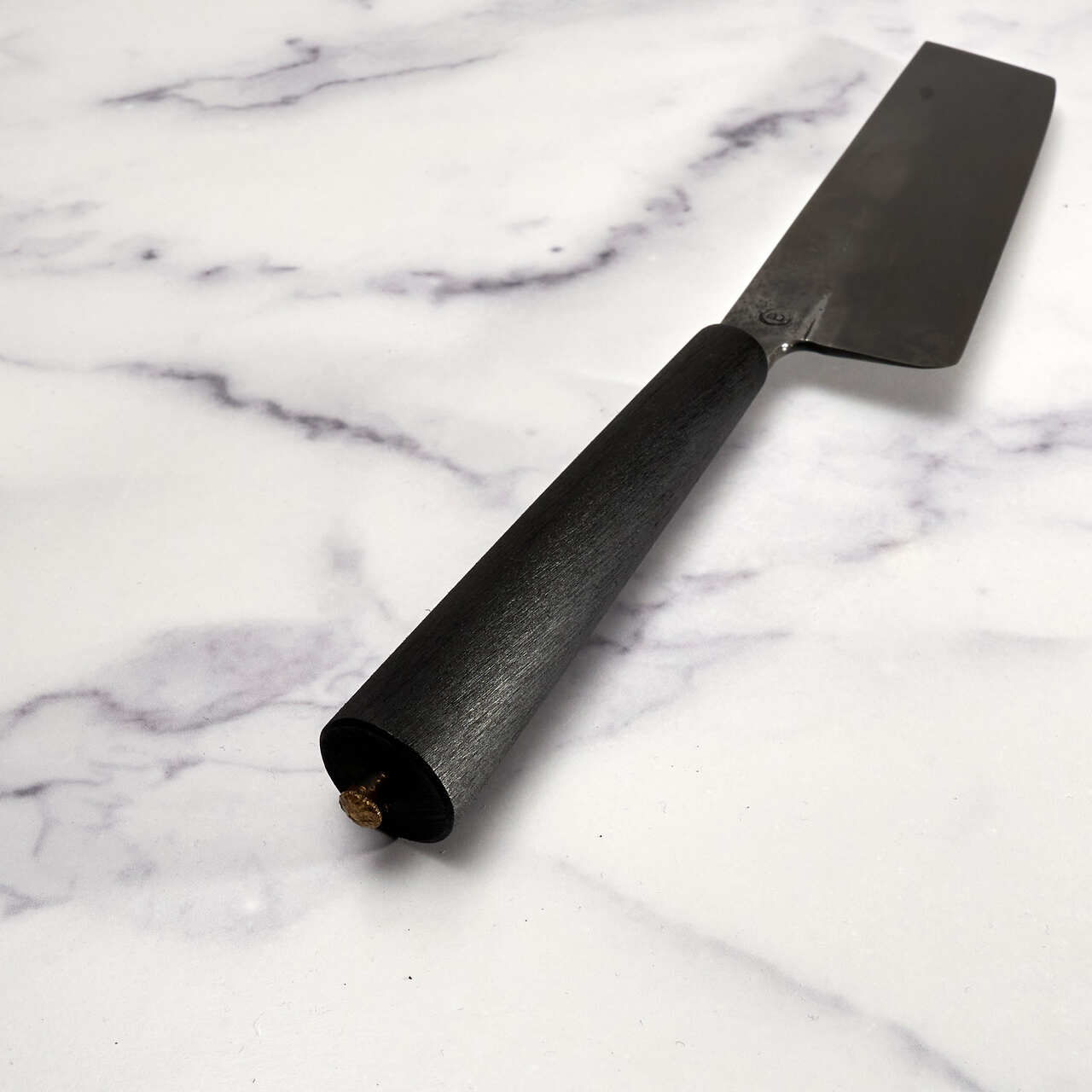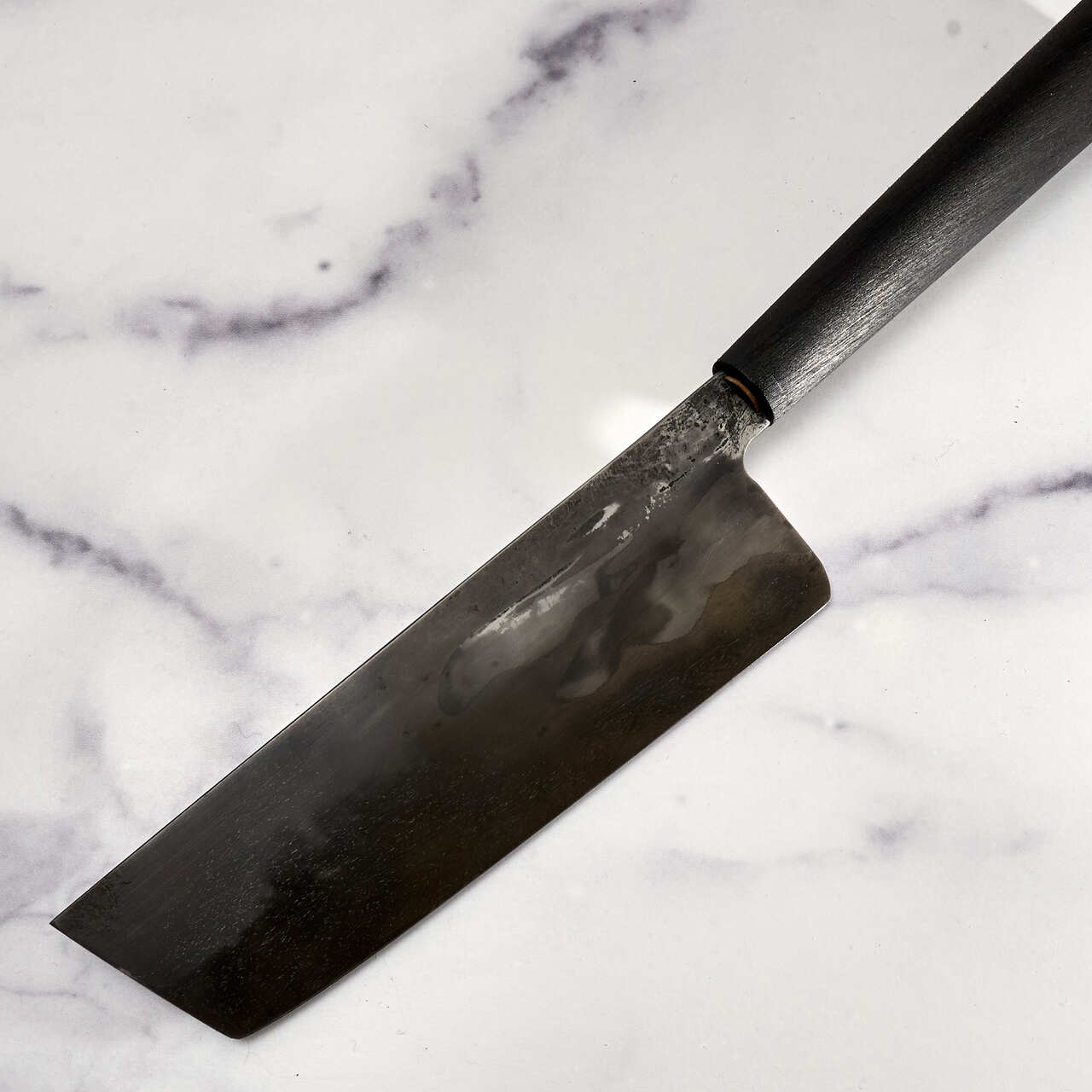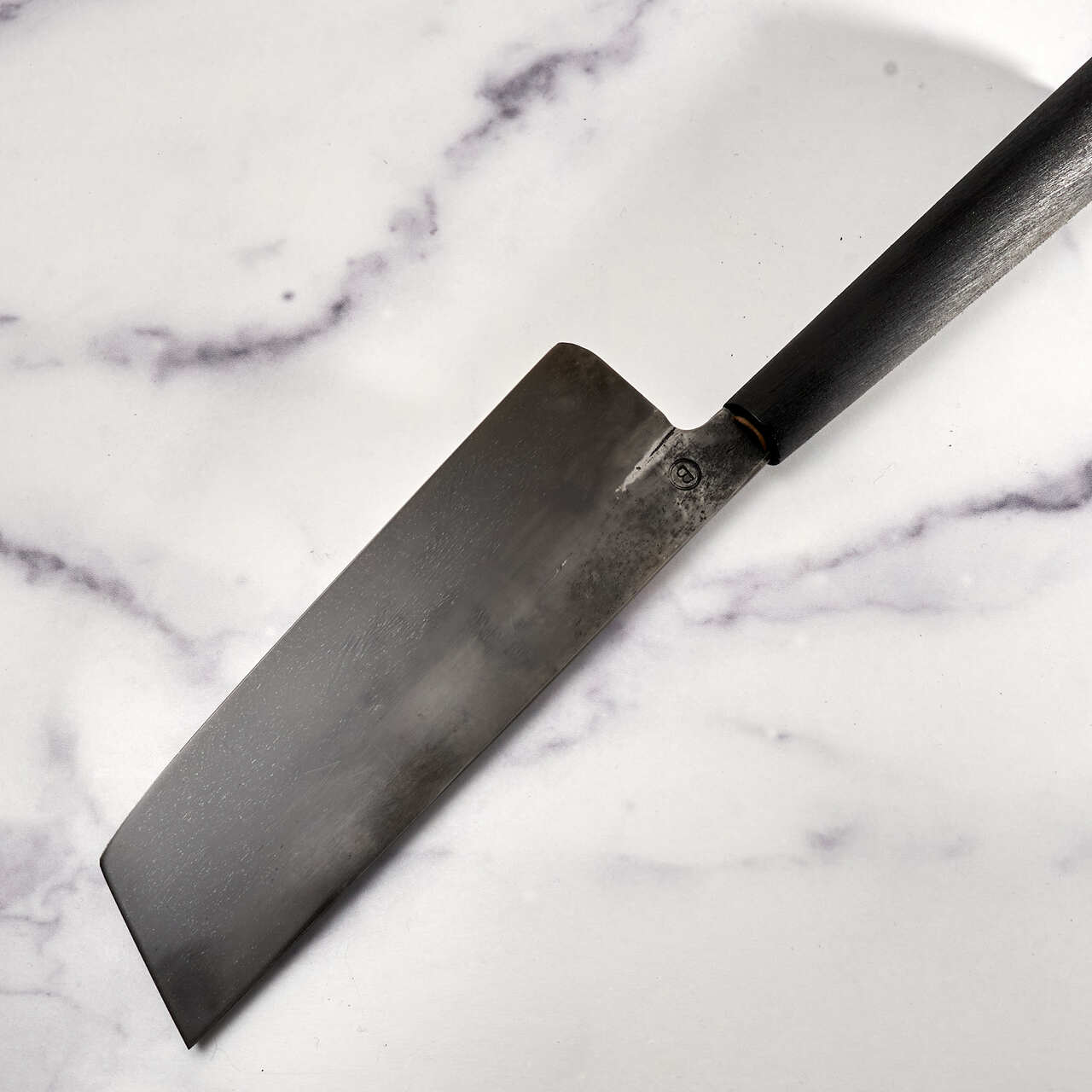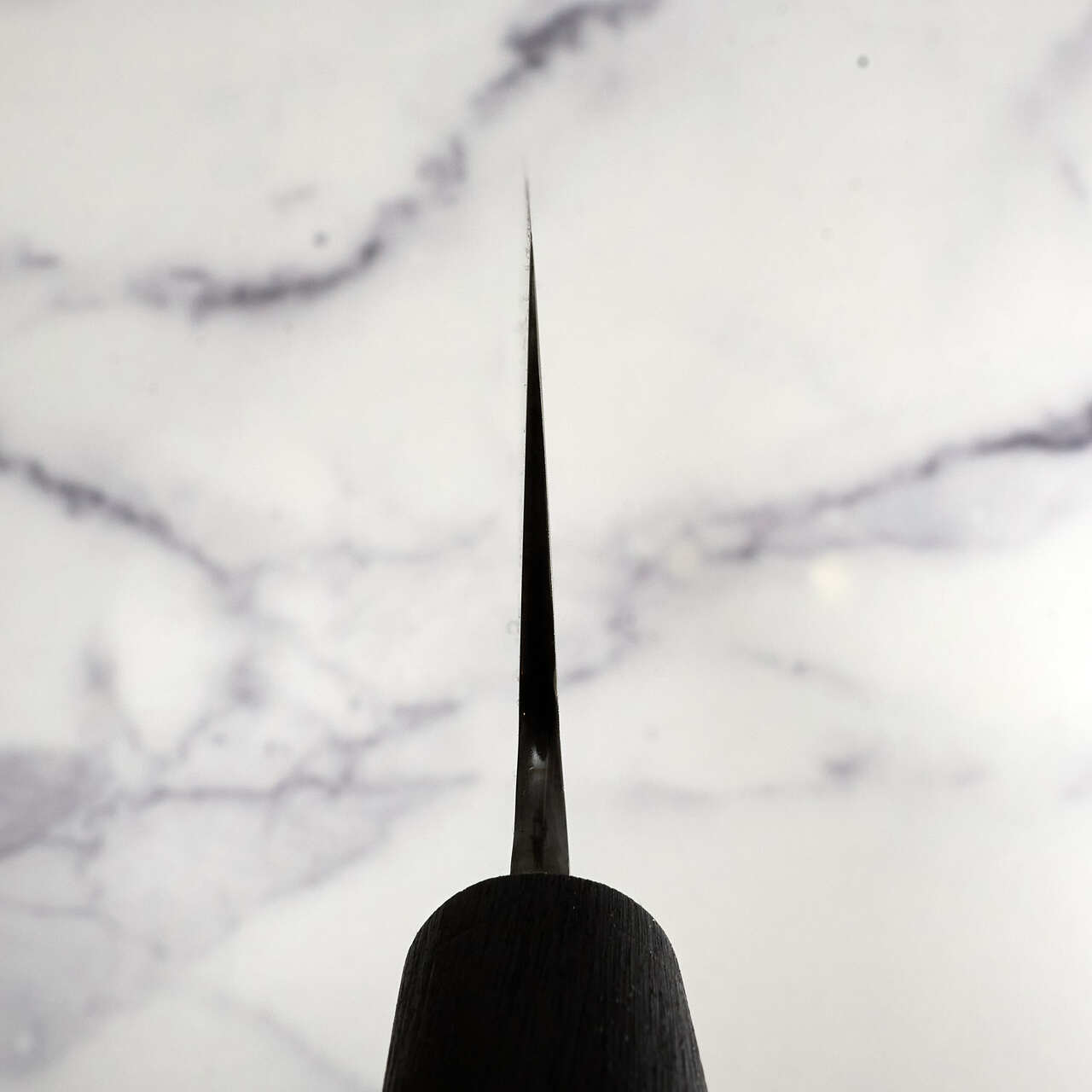170mm Nakiri OB Wootz with Composite Handle
A combination of elements makes Wootz steel interesting when it comes to knife making. Firstly, is its association with the origins of Damascus steel. The truth is that nobody really knows where Damascus steel came from or how it was originally produced. Today when we refer to Damascus, we are most commonly referring to pattern wielded steel, the layered steel produced by wielding various soft and hard steels together.
Wootz steel refers to crucible steel. It is made by melting a combination of elements in a crucible to form a small ingot of high carbon steel that is then forged and thermal cycled in a specific manner that leads to highly refined carbide bands that produce the final pattern when the steel is etched.
The high carbon content and the refined carbides can produce extremely tough steels that take very fine edges. The problem is that in most cases it is truly difficult to know the final content of a crucible steel and it is possible that the carbon content is much lower than often predicted.
Jezz at Oblivion Blades has each of his ingots tested to know precisely how much of each element is contained within. This blade contains a very reasonable 1.6C 0.4W 0.35Cr, it’s a very decent piece of Wootz.
So, with the technical stuff out of the way, a little about the blade itself.
Firstly, for a Nakiri you might see the angled handle as a little unorthodox, but the angle is perfectly suited to the profile of the blade which tapers towards the nose of the knife. In use this geometry actually relieves tension in the wrist, and I believe would reduce fatigue over time.
If you know the origins of the Nakiri, it was first developed as an easy-to-use vegetable knife, mainly for the home. The knife was modelled on the Japanese Usuba, which is used for a particular cutting style called Katsuramuki or Rotary Pealing a technique that involves holding a piece of vegetable in one hand and peeling away a thin layer by rotating the vegetable against the blade while moving the knife in a subtle, up and down motion. In my limited experience with this technique I believe the angled design would make this process a little easier.
The blade is very thin at the edge, about 0.2mm, and remains fairly thin for about 1cm above the edge, giving the knife a razor like property that is perfect for vegetable prep. The knife is nicely balance for a pinch grip and the balance point sits precisely on the Oblivion Blades, makers mark.
Crucible steel or Wootz is a very labour-intensive steel to produce and to find a premium kitchen knife of this standard in such a unique high carbon steel is an absolute rarity. Jezz is a very talented knife maker and steel producer, and the combination is proving to result in some amazing kitchen knives. This is absolutely no exception. A great 170mm Nakiri, in an amazing, tough steel and with a tonne of style!
Product Specification
Blade Type: Nakiri
Overall length:
Edge Length: 170mm
Spine Heel: 3.55mm
Spine Mid: 3.05mm
Spine Tip (20mm before): 2.2mm
Blade Height: 59mm
Weight: 272g
Cutting Edge Steel: Crucible Steel (Wootz, Bulat, etc)
Stainless: No
HRC: 63
Blade Construction: Crucible Steel
Blade Finish: Matte Polish
Grind: Convex
Handle Construction: Hidden Tang
Handle Materials: OB Composite with Brass Pin & Tasmanian Oak dowel
Handedness: Ambidextrous
Saya, Hand Crafted Storage or Display Included: No
Shipping & Returns
Shipping
We process orders 5 days a week (Monday - Friday) and ship from our shop in Sydney, Australia. We ship with FedEx, UPS and DHL.
We are happy to offer free international shipping on a variety of orders depending on location and order value. You can check to see where things sit for you below.
Free Shipping Regions and Minimum Order Values
The service provided is at our discretion, but these values have been calculated based on our shipping rates.
For Australia and New Zealand the minimum is $500AUD for the rest of the world it is approximately €1000EUR. The discount is applied automatically when you reach the minimum cart value and will be applied at checkout. It is approximately a 5% discount :)
Returns
At Modern Cooking, we want you to be inspired and delighted by your purchases. However, we understand that sometimes a return is necessary. This policy is in addition to your rights under the Australian Consumer Law.
Standard Returns (Change of Mind)
If you're not entirely happy with your purchase, you can return it within 14 days of delivery for a refund. The item must be in its original condition with all original packaging.
To start a return, please log into your customer account and process the request, or send us an email and we'll be happy to assist you. Please note that all returns are subject to our approval.
- Returns are accepted for 14 days.
- The customer is responsible for return shipping costs.
- A 15% restocking fee may be applied to returns for change of mind.
- We do not accept returns on second-hand items for change of mind.
What if my item is faulty or damaged?
In the unlikely event that your order arrives faulty or is damaged in transit, we're here to help. Your purchase is protected by the Australian Consumer Law.
- You must notify us within 5 business days of receiving your order to be eligible for a return or replacement. All of our logistics partners provide insurance, but it's only valid if we are notified within this timeframe. Please inspect your order immediately upon receipt.
- You will need to provide photographic evidence of the damage.
- Once approved, Modern Cooking will cover the costs of return shipping.
After we receive the damaged goods, we will issue a full refund or send a replacement, whichever you prefer.
Why do I have to pay tariffs and duties?
Tariffs and duties are taxes imposed by the destination country's government on imported goods. These charges are not set by our company but are determined by your country's customs agency. The specific amount can vary based on the item's value, type, and the country it's being shipped to.
What happens if I refuse to pay tariffs and duties?
When you place an international order with us, you are responsible for paying any tariffs and duties that your country's customs agency may charge. If you refuse to pay these fees and the package is returned to us, please be aware that we will deduct all shipping costs from your refund, including the original shipping to you and the return shipping back to us. Additionally, a 15% restocking fee may be applied to cover the costs associated with the return and processing of the item.
We strongly encourage you to understand your country's import regulations and be prepared for these potential fees before placing your order. This will help you avoid any unexpected charges and ensure a smooth delivery process.
Product Care:
Cleaning: Clean by hand with warm water. Avoid wetting the handle when possible.
Sharpening: We advise using whetstones to sharpen your knives and a honing rod or steel to maintain the burr between sharpening sessions.
Reactive Steels: Reactive steels like Aogami Super, Apex Ultra or one of the many premium reactive German and Swedish steels are susceptible to rust if not properly cared for. In this case we advise that you keep the knife dry between uses and when storing the knife for longer periods wiping the knife blade with Tsubaki oil or another food safe oil is a wise choice. This will not stop a patina forming on the blade, but it will stop rust. A patina can be a beautiful personal feature on your knife and helps to stop rust forming. So, dry your knife regularly between uses, store in a dry place and apply some Tsubaki oil from time to time when storing for long periods.
A reference guide to steel types
Handle Care: If you have a knife with a non-stabilised wooden handle, you can apply Tsubaki oil or another food safe oil to your handle from time to time. Food safe wax can be applied to both stabilised and no-stabilised wooden handles. Never apply hot wax or oil as you risk warping or damaging the handle.










